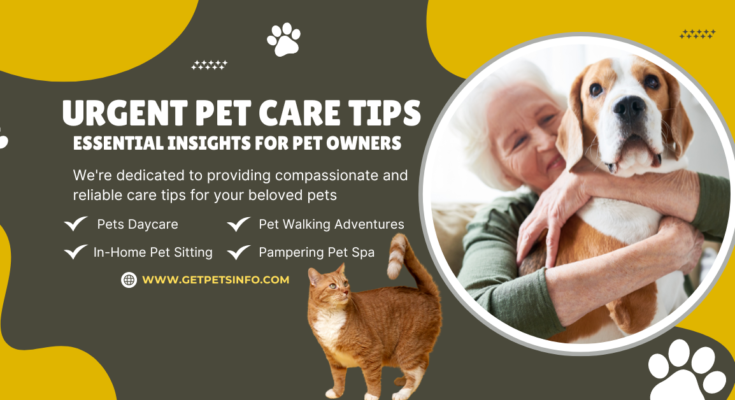Urgent Pet Care Tips
As a pet owner, ensuring the health and well-being of your furry companion is of utmost importance. This comprehensive guide provides 10 expert-approved Urgent Pet Care Tips to help you navigate the critical aspects of pet care, empowering you to handle your pet’s health needs with confidence. From recognizing the signs of illness to administering first aid, this article equips you with the essential knowledge to act swiftly and effectively in times of emergency.
Discover the importance of maintaining a balanced diet, implementing a proper grooming routine, and keeping your pet’s living environment clean and safe.Delve into the world of preventative healthcare, learning about the significance of regular check-ups, vaccinations, and dental care. Uncover effective training techniques that strengthen the bond between you and your pet, fostering a harmonious and obedient relationship.
1. Nutritional Essentials: Providing a Balanced Diet for Your Pet

Ensuring your pet receives proper nutrition is crucial for their overall health and well-being. Just like humans, pets require a balanced diet to thrive. Providing the right nutrients in the right amounts can help prevent various health issues and support their energy levels and immune system.
A well-balanced diet for your pet typically consists of a combination of protein, carbohydrates, fats, vitamins, and minerals. Different pets have different dietary needs, so it’s essential to consult with your veterinarian to determine the best Urgent Pet Care Tips and diet plan for your furry friend. Whether you choose commercial pet food or opt for homemade meals, it’s important to ensure that it meets your pet’s nutritional requirements.
2. Grooming Guide: Keeping Your Pet Clean and Healthy

Regular grooming is essential for maintaining your pet’s cleanliness and overall health. Depending on the type of pet you have, grooming routines may vary. For example, dogs may require regular baths, brushing, nail trimming, and ear cleaning, while cats may need less frequent bathing but still require regular brushing and nail trimming.
Grooming not only keeps your pet looking and smelling fresh but also helps prevent various health issues such as matting of fur, skin infections, and ear infections. Additionally, grooming sessions provide an excellent opportunity to bond with your pet and monitor their overall health, including any changes in their skin or coat.
3. Exercise and Play: Keeping Your Pet Active and Happy
Through Urgent Pet Care Tips Regular exercise is vital for keeping your pet physically and mentally stimulated. Dogs, in particular, benefit from daily walks, playtime, and interactive toys that challenge their minds and bodies. Cats also require opportunities for play and exploration, whether it’s through interactive toys, climbing structures, or simply chasing a laser pointer.
Engaging in regular exercise and play not only helps prevent obesity and related health issues but also strengthens the bond between you and your pet. It provides them with an outlet for their energy and helps alleviate boredom and stress, leading to a happier and healthier pet overall.
4. Healthcare Basics: Understanding Your Pet’s Medical Needs
Understanding your pet’s medical needs through Urgent Pet Care Tips is essential for providing them with proper healthcare. Regular veterinary check-ups are crucial for monitoring your pet’s health and catching any potential issues early on. Vaccinations, parasite prevention, and dental care are also important aspects of your pet’s healthcare routine.
In addition to preventive care, it’s essential to be aware of common signs of illness or injury in pets, such as changes in appetite, behavior, or energy levels. Knowing when to seek veterinary care can make a significant difference in your pet’s prognosis and quality of life.
5. Training Tips: Building a Strong Bond with Your Pet
Training is not only about teaching your pet commands; it’s also about building a strong bond based on trust and mutual respect. Positive reinforcement techniques, such as rewards and praise, are effective for teaching your pet desired behaviors and strengthening your relationship with them.
Consistency and patience are key when it comes to training your pet. Set clear boundaries and expectations, and be prepared to reinforce them consistently. Remember that training takes time and effort but can ultimately lead to a well-behaved and happy pet.
6. Socialization Strategies: Helping Your Pet Thrive Among Others
Socialization is crucial for helping your pet feel comfortable and confident in various environments and around different people and animals. Early and ongoing socialization is particularly important for puppies and kittens, as it helps prevent fearfulness and aggression later in life.
Expose your pet to a wide range of experiences, including different people, animals, sounds, and environments, in a positive and controlled manner. Gradually increase the intensity of these experiences as your pet becomes more comfortable, and always prioritize their safety and well-being.
7. Safety First: Creating a Pet-Friendly Environment at Home
Creating a safe environment for your pet is essential for preventing accidents and injuries. Remove any potential hazards, such as toxic plants, electrical cords, small objects that could be swallowed, and secure cabinets containing cleaning supplies and other chemicals.
Provide your pet with a designated area where they can feel safe and comfortable, whether it’s a cozy bed in a quiet corner or a crate for times when they need some alone time. Supervise your pet whenever they’re exploring new areas of your home, and consider using baby gates or pet barriers to restrict access to certain areas.
8. Dental Care: Maintaining Your Pet’s Oral Health
Dental care is often overlooked but is an essential aspect of your pet’s overall health and well-being. Poor dental hygiene can lead to gum disease, tooth decay, and other dental issues that can impact your pet’s quality of life.
9. Traveling with Pets: Tips for Safe and Stress-Free Journeys
Remember our Urgent Pet Care Tips and make sure while traveling with your pet can be an enjoyable experience with proper planning and preparation. Whether you’re taking a road trip, flying, or staying in a pet-friendly hotel, it’s essential to ensure your pet’s safety and comfort throughout the journey.
Before traveling, make sure your pet is up-to-date on vaccinations and has a microchip and ID tag with your contact information.
Pack essential items such as food, water, medication, and familiar bedding or toys to help your pet feel at ease in unfamiliar surroundings. Consider acclimating your pet to travel carriers or crates beforehand, and take frequent breaks during long trips to allow your pet to stretch their legs and relieve themselves.
10. Emotional Well-being: Supporting Your Pet’s Mental Health
Just like humans, pets can experience a range of emotions, including happiness, fear, anxiety, and loneliness. It’s essential to pay attention to your pet’s emotional well-being and provide them with the support they need to feel safe, secure, and loved.
Spend quality time with your pet, engaging in activities they enjoy and offering plenty of affection and attention. Create a predictable routine to help reduce stress and anxiety, and provide your pet with a comfortable and stimulating environment that meets their physical and mental needs.
If you notice any signs of emotional distress in your pet, such as excessive barking, destructive behavior, or changes in appetite or sleep patterns, consult with your veterinarian for guidance and support.




